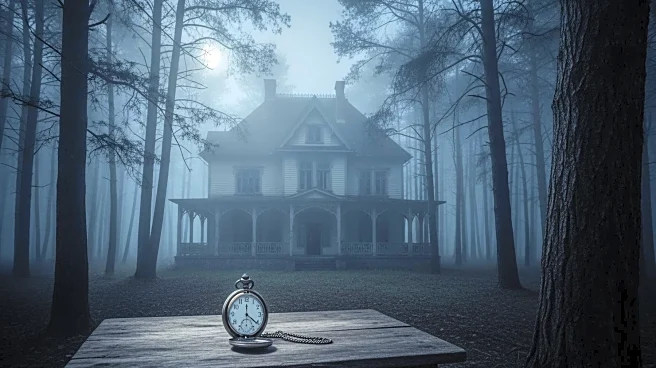What's Happening?
Zach Cregger is directing a new Resident Evil movie set in the iconic Raccoon City, as revealed by recent production photos. The images show Prague transformed into a snowy version of Raccoon City, complete
with props and artificial snow. The setting suggests the film takes place before the events of Resident Evil 3, which ends with the city's destruction in October 1998. The timeline appears to be set in the spring of 1998, months before key characters like Chris Redfield and Jill Valentine arrive. The film will not retell the stories of the video games but will exist within the same universe. Austin Abrams is expected to play the lead role, possibly as an organ courier who encounters a full-blown outbreak.
Why It's Important?
This new Resident Evil movie represents a fresh take on the franchise, aiming to expand the universe without contradicting established video game narratives. By setting the film in a familiar yet unexplored timeline, it offers fans a new perspective on the events leading up to the iconic outbreak. The decision to focus on new characters and stories could attract both long-time fans and newcomers, potentially revitalizing interest in the Resident Evil series. The film's release could impact the entertainment industry by setting a precedent for video game adaptations that respect original lore while introducing innovative storytelling.
What's Next?
The movie is slated for release on September 18, 2026, with anticipation building among fans. Prior to this, Resident Evil Requiem will launch on February 27, returning viewers to the ruins of Raccoon City. As production continues, more details about the plot and character development are likely to emerge, potentially influencing fan expectations and marketing strategies. Stakeholders in the film industry may watch closely to see how this adaptation performs, considering its unique approach to a well-established franchise.
Beyond the Headlines
The film's approach to storytelling raises questions about the balance between innovation and tradition in adaptations. By choosing not to feature iconic characters, the movie challenges conventional expectations and could influence future adaptations of popular franchises. This decision may also reflect broader trends in the entertainment industry, where creators seek to diversify narratives and explore untapped aspects of established universes.









